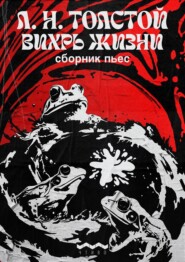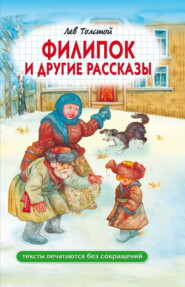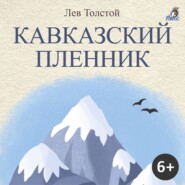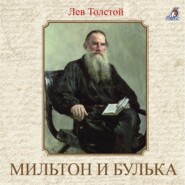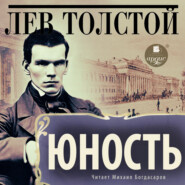По всем вопросам обращайтесь на: info@litportal.ru
(©) 2003-2025.
✖
Hadji Murad / Хаджи-Мурат. Книга для чтения на английском языке
Автор
Год написания книги
2019
Настройки чтения
Размер шрифта
Высота строк
Поля
“Then take him there and return to the wood. I shall be there too.”
“I will do it all,” said Bata, rising, and putting his hands on his heart he went out.
Hadji Murad turned to his host.
“A man must also be sent to Chekhi,” he began, and took hold of one of the cartridge pouches of his Circassian coat, but let his hand drop immediately and became silent on seeing two women enter the saklya.
One was Sado’s wife – the thin middle-aged woman who had arranged the cushions. The other was quite a young girl, wearing red trousers and a green beshmet. A necklace of silver coins covered the whole front of her dress, and at the end of the short but thick plait of hard black hair that hung between her thin shoulder-blades a silver ruble was suspended. Her eyes, as sloe-black as those of her father and brother, sparkled brightly in her young face which tried to be stern. She did not look at the visitors, but evidently felt their presence.
Sado’s wife brought in a low round table on which stood tea, pancakes in butter, cheese, churek (that is, thinly rolled out bread), and honey. The girl carried a basin, a ewer, and a towel.
Sado and Hadji Murad kept silent as long as the women, with their coin ornaments tinkling, moved softly about in their red soft-soled slippers, setting out before the visitors the things they had brought. Eldar sat motionless as a statue, his ram-like eyes fixed on his crossed legs, all the time the women were in the saklya. Only after they had gone and their soft footsteps could no longer be heard behind the door, did he give a sigh of relief.
Hadji Murad having pulled out a bullet from one of the cartridge-pouches of his Circassian coat, and having taken out a rolled-up note that lay beneath it, held it out, saying:
“To be handed to my son.”
“Where must the answer be sent?”
“To thee; and thou must forward it to me.”
“It shall be done,” said Sado, and placed the note in the cartridge-pocket of his own coat. Then he took up the metal ewer and moved the basin towards Hadji Murad.
Hadji Murad turned up the sleeves of his beshmet on his white muscular arms, held out his hands under the clear cold water which Sado poured from the ewer, and having wiped them on a clean unbleached towel, turned to the table. Eldar did the same. While the visitors ate, Sado sat opposite and thanked them several times for their visit. The boy sat by the door never taking his sparkling eyes off Hadji Murad’s face, and smiled as if in confirmation of his father’s words.
Though he had eaten nothing for more than twenty-four hours Hadji Murad ate only a little bread and cheese; then, drawing out a small knife from under his dagger, he spread some honey on a piece of bread.
“Our honey is good,” said the old man, evidently pleased to see Hadji Murad eating his honey. “This year, above all other years, it is plentiful and good.”
“I thank thee,” said Hadji Murad and turned from the table. Eldar would have liked to go on eating but he followed his leader’s example, and having moved away from the table, handed him the ewer and basin.
Sado knew that he was risking his life by receiving such a guest in his house, for after his quarrel with Shamil the latter had issued a proclamation to all the inhabitants of Chechnya forbidding them to receive Hadji Murad on pain of death. He knew that the inhabitants of the aoul might at any moment become aware of Hadji Murad’s presence in his house and might demand his surrender. But this not only did not frighten Sado, it even gave him pleasure with himself because he was doing his duty.
“Whilst thou are in my house and my head is on my shoulders no one shall harm thee,” he repeated to Hadji Murad.
Hadji Murad looked into his glittering eyes and understanding that this was true, said with some solemnity – “Mayst thou receive joy and life!”
Sado silently laid his hand on his heart in token of thanks for these kind words.
Having closed the shutters of the saklya and laid some sticks in the fireplace, Sado, in an exceptionally bright and animated mood, left the room and went into that part of his saklya where his family all lived. The women had not yet gone to sleep, and were talking about the dangerous visitors who were spending the night in their guest chambers.
Chapter II
At Vozvizhensk, the advanced fort situated some ten miles from the aoul in which Hadji Murad was spending the night, three soldiers and a non-commissioned officer left the fort and went beyond the Shahgirinsk Gate. The soldiers, dressed as Caucasian soldiers used to be in those days, wore sheepskin coats and caps, and boots that reached above their knees, and they carried their cloaks tightly rolled up and fastened across their shoulders. Shouldering arms, they first went some five hundred paces along the road and then turned off it and went some twenty paces to the right – the dead leaves rustling under their boots – till they reached the blackened trunk of a broken plane tree just visible through the darkness. There they stopped. It was at this plane tree that an ambush party was usually placed.
The bright stars, that had seemed to be running along the tree tops while the soldiers were walking through the forest, now stood still, shining brightly between the bare branches of the trees.
“A good job it’s dry,” said the non-commissioned officer Panov, bringing down his long gun and bayonet with a clang from his shoulder and placing it against the plane tree.
The three soldiers did the same.
“Sure enough I’ve lost it!” muttered Panov crossly. “Must have left it behind or I’ve dropped it on the way.”
“What are you looking for?” asked one of the soldiers in a bright, cheerful voice.
“The bowl of my pipe. Where the devil has it got to?”
“Have you got the stem?” asked the cheerful voice.
“Here it is.”
“Then why not stick it straight into the ground?” “Not worth bothering!”
“We’ll manage that in a minute.”
Smoking in ambush was forbidden, but this ambush hardly deserved the name. It was rather an outpost to prevent the mountaineers from bringing up a cannon unobserved and firing at the fort as they used to. Panov did not consider it necessary to forego the pleasure of smoking, and therefore accepted the cheerful soldier’s offer. the latter took a knife from his pocket and made a small round hole in the ground. Having smoothed it, he adjusted the pipe stem to it, then filled the hole with tobacco and pressed it down, and the pipe was ready. A sulphur match flared and for a moment lit up the broad-cheeked face of the soldier who lay on his stomach, the air whistled in the stem, and Panov smelt the pleasant odor of burning tobacco.
“Fixed ut up?” said he, rising to his feet.
“Why, of course!”
“What a smart chap you are, Avdeev! … As wise as a judge! Now then, lad.”
Avdeev rolled over on his side to make room for Panov, letting smoke escape from his mouth.
Panov lay down prone, and after wiping the mouthpiece with his sleeve, began to inhale.
When they had had their smoke the soldiers began to talk.
“They say the commander has had his fingers in the cashbox again,” remarked one of them in a lazy voice. “He lost at cards, you see.”
“He’ll pay it back again,” said Panov.
“Of course he will! He’s a good officer,” assented Avdeev.
“Good! good!” gloomily repeated the man who had started the conversation. “In my opinion the company ought to speak to him. If you’ve taken the money, tell us how much and when you’ll repay it.’”
“That will be as the company decides,” said Panov, tearing himself away from the pipe.
“Of course. The community is a strong man,’” assented Avdeev, quoting a proverb.
“There will be oats to buy and boots to get towards spring. the money will be wanted, and what shall we do if he’s pocketed it?” insisted the dissatisfied one.
“I tell you it will be as the company wishes,” repeated Panov. “It’s not the first time; he takes it and gives it back.”
In the Caucasus in those days each company chose men to manage its own commissariat. they received 6 rubles 50 kopeks a month per man from the treasury, and catered for the company. They planted cabbages, made hay, had their own carts, and prided themselves on their well-fed horses. The company’s money was kept in a chest of which the commander had the key, and it often happened that he borrowed from the chest. This had just happened again, and the soldiers were talking about it. The morose soldier, Nikitin, wished to demand an account from the commander, while Panov and Avdeev considered that unnecessary.
After Panov, Nikitin had a smoke, and then spreading his cloak on the ground sat down on it leaning against the trunk of the plane tree. The soldiers were silent. Far above their heads the crowns of the trees rustled in the wind and suddenly, above this incessant low rustling, rose the howling, whining, weeping and chuckling of jackals.
“I will do it all,” said Bata, rising, and putting his hands on his heart he went out.
Hadji Murad turned to his host.
“A man must also be sent to Chekhi,” he began, and took hold of one of the cartridge pouches of his Circassian coat, but let his hand drop immediately and became silent on seeing two women enter the saklya.
One was Sado’s wife – the thin middle-aged woman who had arranged the cushions. The other was quite a young girl, wearing red trousers and a green beshmet. A necklace of silver coins covered the whole front of her dress, and at the end of the short but thick plait of hard black hair that hung between her thin shoulder-blades a silver ruble was suspended. Her eyes, as sloe-black as those of her father and brother, sparkled brightly in her young face which tried to be stern. She did not look at the visitors, but evidently felt their presence.
Sado’s wife brought in a low round table on which stood tea, pancakes in butter, cheese, churek (that is, thinly rolled out bread), and honey. The girl carried a basin, a ewer, and a towel.
Sado and Hadji Murad kept silent as long as the women, with their coin ornaments tinkling, moved softly about in their red soft-soled slippers, setting out before the visitors the things they had brought. Eldar sat motionless as a statue, his ram-like eyes fixed on his crossed legs, all the time the women were in the saklya. Only after they had gone and their soft footsteps could no longer be heard behind the door, did he give a sigh of relief.
Hadji Murad having pulled out a bullet from one of the cartridge-pouches of his Circassian coat, and having taken out a rolled-up note that lay beneath it, held it out, saying:
“To be handed to my son.”
“Where must the answer be sent?”
“To thee; and thou must forward it to me.”
“It shall be done,” said Sado, and placed the note in the cartridge-pocket of his own coat. Then he took up the metal ewer and moved the basin towards Hadji Murad.
Hadji Murad turned up the sleeves of his beshmet on his white muscular arms, held out his hands under the clear cold water which Sado poured from the ewer, and having wiped them on a clean unbleached towel, turned to the table. Eldar did the same. While the visitors ate, Sado sat opposite and thanked them several times for their visit. The boy sat by the door never taking his sparkling eyes off Hadji Murad’s face, and smiled as if in confirmation of his father’s words.
Though he had eaten nothing for more than twenty-four hours Hadji Murad ate only a little bread and cheese; then, drawing out a small knife from under his dagger, he spread some honey on a piece of bread.
“Our honey is good,” said the old man, evidently pleased to see Hadji Murad eating his honey. “This year, above all other years, it is plentiful and good.”
“I thank thee,” said Hadji Murad and turned from the table. Eldar would have liked to go on eating but he followed his leader’s example, and having moved away from the table, handed him the ewer and basin.
Sado knew that he was risking his life by receiving such a guest in his house, for after his quarrel with Shamil the latter had issued a proclamation to all the inhabitants of Chechnya forbidding them to receive Hadji Murad on pain of death. He knew that the inhabitants of the aoul might at any moment become aware of Hadji Murad’s presence in his house and might demand his surrender. But this not only did not frighten Sado, it even gave him pleasure with himself because he was doing his duty.
“Whilst thou are in my house and my head is on my shoulders no one shall harm thee,” he repeated to Hadji Murad.
Hadji Murad looked into his glittering eyes and understanding that this was true, said with some solemnity – “Mayst thou receive joy and life!”
Sado silently laid his hand on his heart in token of thanks for these kind words.
Having closed the shutters of the saklya and laid some sticks in the fireplace, Sado, in an exceptionally bright and animated mood, left the room and went into that part of his saklya where his family all lived. The women had not yet gone to sleep, and were talking about the dangerous visitors who were spending the night in their guest chambers.
Chapter II
At Vozvizhensk, the advanced fort situated some ten miles from the aoul in which Hadji Murad was spending the night, three soldiers and a non-commissioned officer left the fort and went beyond the Shahgirinsk Gate. The soldiers, dressed as Caucasian soldiers used to be in those days, wore sheepskin coats and caps, and boots that reached above their knees, and they carried their cloaks tightly rolled up and fastened across their shoulders. Shouldering arms, they first went some five hundred paces along the road and then turned off it and went some twenty paces to the right – the dead leaves rustling under their boots – till they reached the blackened trunk of a broken plane tree just visible through the darkness. There they stopped. It was at this plane tree that an ambush party was usually placed.
The bright stars, that had seemed to be running along the tree tops while the soldiers were walking through the forest, now stood still, shining brightly between the bare branches of the trees.
“A good job it’s dry,” said the non-commissioned officer Panov, bringing down his long gun and bayonet with a clang from his shoulder and placing it against the plane tree.
The three soldiers did the same.
“Sure enough I’ve lost it!” muttered Panov crossly. “Must have left it behind or I’ve dropped it on the way.”
“What are you looking for?” asked one of the soldiers in a bright, cheerful voice.
“The bowl of my pipe. Where the devil has it got to?”
“Have you got the stem?” asked the cheerful voice.
“Here it is.”
“Then why not stick it straight into the ground?” “Not worth bothering!”
“We’ll manage that in a minute.”
Smoking in ambush was forbidden, but this ambush hardly deserved the name. It was rather an outpost to prevent the mountaineers from bringing up a cannon unobserved and firing at the fort as they used to. Panov did not consider it necessary to forego the pleasure of smoking, and therefore accepted the cheerful soldier’s offer. the latter took a knife from his pocket and made a small round hole in the ground. Having smoothed it, he adjusted the pipe stem to it, then filled the hole with tobacco and pressed it down, and the pipe was ready. A sulphur match flared and for a moment lit up the broad-cheeked face of the soldier who lay on his stomach, the air whistled in the stem, and Panov smelt the pleasant odor of burning tobacco.
“Fixed ut up?” said he, rising to his feet.
“Why, of course!”
“What a smart chap you are, Avdeev! … As wise as a judge! Now then, lad.”
Avdeev rolled over on his side to make room for Panov, letting smoke escape from his mouth.
Panov lay down prone, and after wiping the mouthpiece with his sleeve, began to inhale.
When they had had their smoke the soldiers began to talk.
“They say the commander has had his fingers in the cashbox again,” remarked one of them in a lazy voice. “He lost at cards, you see.”
“He’ll pay it back again,” said Panov.
“Of course he will! He’s a good officer,” assented Avdeev.
“Good! good!” gloomily repeated the man who had started the conversation. “In my opinion the company ought to speak to him. If you’ve taken the money, tell us how much and when you’ll repay it.’”
“That will be as the company decides,” said Panov, tearing himself away from the pipe.
“Of course. The community is a strong man,’” assented Avdeev, quoting a proverb.
“There will be oats to buy and boots to get towards spring. the money will be wanted, and what shall we do if he’s pocketed it?” insisted the dissatisfied one.
“I tell you it will be as the company wishes,” repeated Panov. “It’s not the first time; he takes it and gives it back.”
In the Caucasus in those days each company chose men to manage its own commissariat. they received 6 rubles 50 kopeks a month per man from the treasury, and catered for the company. They planted cabbages, made hay, had their own carts, and prided themselves on their well-fed horses. The company’s money was kept in a chest of which the commander had the key, and it often happened that he borrowed from the chest. This had just happened again, and the soldiers were talking about it. The morose soldier, Nikitin, wished to demand an account from the commander, while Panov and Avdeev considered that unnecessary.
After Panov, Nikitin had a smoke, and then spreading his cloak on the ground sat down on it leaning against the trunk of the plane tree. The soldiers were silent. Far above their heads the crowns of the trees rustled in the wind and suddenly, above this incessant low rustling, rose the howling, whining, weeping and chuckling of jackals.






